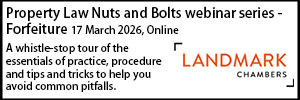- Details
The power of positive thinking
 The majority of local government lawyers remain upbeat about their choice of career and their department, writes Philip Hoult. But they have strong views on how things could be improved.
The majority of local government lawyers remain upbeat about their choice of career and their department, writes Philip Hoult. But they have strong views on how things could be improved.
Huge cuts to local authority budgets. Relentless pressure on pay and benefits. Greater demand for legal services.
You might think that, against this backdrop, lawyers working for local authorities would not recommend local government law as a career. Not a bit of it – some 77% of the 214 respondents to our careers and training survey said they would.
“Entry is very competitive and it is important that aspirants know this,” commented one lawyer. “But local government continues to offer a challenging career and the satisfaction of helping deliver a public service.”
Another wrote: “You never just deal with dry law, which makes a legal career in local government exciting, interesting and constantly changing.”
A significant minority (23%) would nevertheless advise lawyers against entering the sector. This is almost certainly a higher figure than you would have had if you had asked the same question a few years ago – many of these respondents said “not at the moment”, “at the current time, no” or something similar.
Getting satisfaction
To drill down further, we asked respondents to rate a number of aspects of their employment on a scale of 1 to 10 (with 10 being most satisfied).
Quality of work was the category to receive the highest rating (7.37 out of 10). Other higher rated aspects were work-life balance (6.95), the ability to influence how to do the job (6.31), the pay and pension (6.20) and the manageability of the workload (6.13). The culture and collegiality of the workplace, which is often cited as one of the trump cards of local government law, drew a reasonably positive score (6.00).
Comfortably at the other end of the scale – and highlighting a real challenge for those with management responsibility within legal services departments – came career prospects, with a lowly 4.38.
Other aspects of employment to finish near the bottom of the list were office and other support facilities (5.04), job security (5.31), quality of leadership (5.36) and professional development opportunities (5.49).
These results were further confirmed when we asked respondents to name the best – and worst – aspects of their working environment. The variety and quality of work was comfortably the most frequent response in relation to the first of these questions.
“There is a broad range of work,” said one respondent. “There is exposure to higher value work than [you would get in] a comparable PQE position in the private sector.”
A real sense of teamwork, opportunities for flexible working and an ethos of providing a public service also came through strongly. “The feeling that you are working for the community and making a difference,” wrote one respondent, also citing “the exceptional quality of the work”. Another reported getting “enormous job satisfaction”, adding that: “You really feel your job makes a difference to the community you serve”.
Respondents were quick, however, to detail some of the worst aspects about working as a lawyer in local government and the public sector.
The number one issue, as mentioned already, was career development – or rather its absence. “There is no clear defined progression – it is very much ‘dead man’s shoes’,” claimed one lawyer. The fact that you may well have to move organisations to progress your career was also criticised.
Levels of remuneration were identified by many who felt that the number of hours they were being required to work was on the rise. “We are paid less than private practice colleagues, there is less money for training and sometimes it feels like we are not seen as being ‘proper’ lawyers because we are in-house local authority lawyers,” was one comment.
Other aspects highlighted included difficult relationships with client departments, low standards of senior management, excessive bureaucracy (including a‘meetings culture’ and ‘tick-box mentalities’ in some authorities), poorly-drafted legislation and the battering the public sector gets from politicians and the media.
On the latter front, one respondent said: “There is a feeling that local authority functions are being devalued. [There has been] erosion of the role of local government, of pride in offering a public service. [Also], the lack of value placed on local government from central government and the depiction in the media of local government somehow being a burden on society, rather than a necessary and positive presence in society.”
Give us the tools
So what steps could employers take to improve lawyers’ working environment? As you might expect, there were many pleas – among the near 150 comments left by respondents – for greater clarity over employment situations and career prospects, as well as improvements to pay.
Less obviously, a virulent dislike emerged among many lawyers for open plan offices and hot-desking, or cramped conditions where noise levels rise. As a result there were comments such as: “Move away from open plan working where it is impossible to concentrate” and “the open plan office is appalling and my desk is so small I can’t properly open my file”.
Another lawyer was meanwhile fearful of an impending office move. “The current environment is pretty good but we will be moved into a smaller space and have a small desk, almost call centre like. This just does not provide the right facilities for legal work.”
There were several calls for department managers to communicate better both with their lawyers and with internal client departments. “Listen to staff requests for changes or improvements”, “listen to my ideas and involve me in decision-making” and “tell us what the hell is going on” were some typical – if in the last case more extreme – comments.
When it comes to internal relationships, some respondents identified a need for heads of department to explain to client departments what legal services can do for them “given the time”. They also need to back their lawyers, manage members’ expectations and provide support when the right decision is made but not liked by the client service.
But easily the most frequent demand was for departments to give their lawyers the tools to do their job properly and more efficiently. So this meant “better, faster IT equipment”, “better business support”, and taking steps “to allow us to do quality work rather than churning through quantity”.
Many recognised that this is hard at a time of such pressure on resources. However, there was a belief that this is a case where ‘investing to save’ could make a real difference.
A problem shared
From this, you can tell that respondents were certainly not backwards in coming forwards with ideas for how their working environment could be improved. On a positive note, nearly three quarters (73%) would recommend their department as a place to work – recognising the pressures they face are shared with other teams across the country and paying tribute to those they work alongside.
“Although it has many issues, these seem to be common to all local authority departments (and indeed many private sector organisations too),” reported one. “My colleagues are generally very amiable and the workloads manageable.”
Similarly: “It is a pleasant and supportive place most of the time. There are some interesting staff members in the council, but the management of the legal team is friendly and cooperative, with a focus on letting staff do their job. There’s no micro management.”
But the survey shows that more than one in four (27%) would not recommend their department. Common themes in these instances included a lack of leadership, a failure to support junior lawyers, insufficient resources or botched shake-ups.
“The department was recently restructured in a spectacularly inept fashion,” one lawyer was prompted to say. “Senior management was told it wouldn’t work. They still pressed ahead. There is no guarantee the department will survive the next few years.”
A majority of respondents nevertheless felt that their team was generally well regarded within their authority or authorities. Some 70% believed that the department was considered to be a ‘trusted adviser’. By contrast, 15% said it was perceived as a ‘remote service department’ and the same percentage felt it had a reputation as a ‘roadblock to change and innovation’.
“It does vary from department to department,” commented one lawyer. “However, members of the council’s senior management team do generally view us as carrying out an important role, even if we are viewed at times as being negative and preventing their (often harebrained, ill-thought out and ultra vires) plans.” Another respondent added: “They do not like any advice that does not support what they want to do.”
Future imperfect
Of course, many departments continue to face a great deal of uncertainty as authorities seek to rationalise the so-called ‘back office’ functions. As a result we wanted to find out from local government lawyers where they felt the future lay and in particular what they thought of shared services.
Nearly two in five respondents (39%) predicted that their team would be part of a shared service, whether a properly integrated one (20%) or an independent team that benefits from a looser shared service arrangement (19%).
“There is a strong possibility a shared service will be foisted upon us and given the lack of commitment of the authority to the department, this might not be a bad thing if it means we get more resources and resilience,” wrote one lawyer.
Almost the same number (38%) believed that their team would remain a standalone department of a similar size to that it enjoys today, while 16% feared that they would be part of a standalone department “of much smaller size”.
Only a handful thought that their departments would become part of a more radical solution, such as being an outsourced function operated by a law firm or an outsourcing provider (3.5%) or as an independent alternative business structure (3.5%). Interestingly, one respondent said their authority planned to become an enabling authority. However, the legal team would not be outsourced as that had been tried before and the decision was taken to bring it back in as the arrangement was costing the council too much.
The comments revealed that perhaps the worst thing was not knowing what the future holds. “It is all up in the air,” acknowledged one respondent. Added another: “Truthfully, we don’t have a clue.”
Scepticism about shared services
The move towards shared legal services has been one of the most prominent trends in the sector in recent years, but what do local government lawyers really think of them?
We asked respondents to rate – as positive, negative or neutral – the effect being employed in a shared services department would or does have on various aspects of their working life and career. The question attracted some strident comments, such as “shared services can be the refuge of those who lack the drive and imagination to reform their own service”.
Shared services were seen in the most positive light in relation to the variety of work that would be on offer (with a rating average of +0.32). Other areas to attract good scores were the training opportunities available (+0.28), the quality of work (+0.27), career development opportunities (+0.25) and support and facilities (+0.20).
However, a number of areas went into negative territory. These were, unsurprisingly perhaps, the location of the office (-0.23). “As location is important to me, I don’t have the slightest intention of travelling somewhere else unless necessary,” wrote one respondent.
But other areas to see negative average ratings were job security (-0.13), the relationship with clients/authorities (-0.08), manageability of workflow (-0.06) and pay and conditions (-0.05).
Addressing these perceptions would therefore appear to be a key management task for those with responsibility for implementing or operating new and existing shared services.
And, judging by the results of a follow-on question, they also have a job on their hands to articulate to a significant minority of lawyers what the attractions of working in a shared services environment are.
Respondents were asked whether they would be more or less likely to apply for a job in a shared services department. A majority (62%) said it would make no significant difference. But more than one in four (27%) felt they would be less likely to apply to join such a department. Only 11% reported that it would make them more likely to apply.
One lawyer commented that “as salaries are being frozen or cut, the only pay rise is through promotion”, adding that “shared services destroy management opportunities – while it may be good for junior staff, it also creates a plateau as there are fewer management posts”.
Still as ambitious
So if the jury is out among local government lawyers about shared services, what are the key factors they take into account when deciding where to work? Do they prefer to be specialists or generalists? And what are their main career ambitions?
Respondents were asked to choose the three most important factors in deciding where to work. The pay and pension on offer received the most mentions overall (112), followed by work-life balance (95), the quality and type of work available (94) and location (89). In fifth to seventh places were job security (41), career prospects (41) and the culture and collegiality at the employer (24).
However, the order changes significantly when it comes to the factors receiving the most number of first choice mentions. In this case the quality and type of work available came top, followed by work-life balance and location – pay and pension came fourth.
A slight majority (53%) of the lawyers who took part meanwhile prefer to be specialists (and many would like to take a post-graduate qualification to boost their career). A quarter (27%) like being generalists and one in five (20%) expressed no preference either way.
The comments revealed recognition that there were risks with both approaches. In relation to specialising, a number of respondents warned against doing so too early in a career and highlighted the importance of retaining some knowledge of other areas of the law. “It is important to have a specialist area whilst at the same time maintaining a generalist approach in order to remain versatile,” one argued.
Others meanwhile pointed to the difficulty of operating as a generalist at a time when the law’s complexity has increased considerably. “William Blake said that to generalise is to be an idiot – I couldn’t put it better myself,” said one lawyer, eruditely if a bit harshly.
When it comes to their career ambitions, the loyalty of local government lawyers to their sector came through strongly. One in four (28%) wanted to remain broadly at their existing level within a local authority or other public sector legal department.
Some 44% meanwhile said their aim was to move into (or up) the management chain within a local authority or other public sector legal department. But, as we have seen earlier from the survey, there is widespread frustration at the declining levels of opportunities for promotion.
This presents a major challenge for management to provide a career structure that goes some way to meeting this desire for promotion. Simply saying “’Twas ever thus” cannot be the best way forward to tackle this issue.
There was, though, surprisingly little appetite for switching into private practice, with fewer than one in 20 respondents (5%) eyeing up a move to a law firm or chambers. Indeed, more wanted to change their career completely (7%) while one in 10 (12%) chose the ‘other option’ – many citing a judicial post or a commercial in-house role as their target.
A handful (3%) would like to follow the example of Southwark Council’s Deborah Collins – who in May 2012 switched from being Strategic Director of Communities, Law and Governance to the post of Strategic Director of Environment and Leisure – and move into a non-legal role within the public sector.
Staying positive
When we set out on this exercise, I have to admit we expected to find a gloomier outlook. It is therefore good to be able to report that local government lawyers remain – by and large – happy with their career choice and the authorities they work for.
Yes, there is plenty of room for improvement. But, given the hammering the public sector has taken in recent years, the overall result is welcome news indeed.
Philip Hoult is Editor of Local Government Lawyer
A locum’s eye view
The survey also sought to find out from locum lawyers what their experiences were and how the departments that hire them could improve their working conditions. This is against a backdrop where the number of locum lawyers has been rising quite significantly.
Although the sample size (12) was small, nevertheless the responses threw up some interesting results. For example, we asked locum lawyers to rate on a scale of 1 to 10 (where 10 was best) how good the induction programme at their present employer was.
More than half of the respondents gave a score of just one or two – a pretty shocking indictment and evidence that some authorities are doing a very poor job at introducing locums into their department. “No induction beyond being shown around the legal department,” reported one.
We also asked locums to reveal the extent to which they feel part of the team at their current employer. In this respect the results were more positive, with half handing their department a score of 9 or 10.
However, three locums gave a score of 3 or lower. “What team?” asked one. “No Lexcel, no office manual, no 1-2-1. It is like stepping back into the dark ages.”
A number of suggestions were made as to the steps that legal departments could take to improve the working environment for locum lawyers. In addition to providing a more comprehensive induction to the department, this wishlist included:
- treating locums the same as employed staff in terms of meetings, information and management;
- providing administrative support;
- helping with time recording and timesheets; and
- providing access to training opportunities.
One, rather exasperated, respondent was moved to write: “Welcome and introduce me to the team, show me how the systems work so I can be effective. Tell me about the relationship with the client department. Stop blaming me for not having a laptop or dictaphone, I keep asking but I am a locum and not a priority. You are my manager, you sort it out, take responsibility for how you run the department.
“I have been there six months and am still not on the group email from the head of department about new procedures and new developments on office or client protocols. I wasn’t given training on the time recording system or case management. I was senior solicitor at my last authority and we had an induction procedure and checklists whether staff were permanent or temp. I had to ask security staff about fire exits. If I knew who to go to when a problem occurred, my time would have been better used and more cost effective.”
Another notable request was to give more timely indications of contract extensions and the scope for becoming a permanent member of staff. Half of the locums who took part in the survey were looking for a permanent role.
So, while the sample size may have been small, the responses should provide food for thought for some local government legal departments out there.
Trained for peak performance
In an environment where demands on legal teams are growing, but – in the vast majority of cases – budgets are being cut, the importance of getting good training remains high. So we thought we would ask local government lawyers if they felt they were getting the training they needed to equip them for their often highly-pressurised roles.
The results were largely positive, with 77% agreeing that they were given adequate training to do their job. But a sizeable proportion (23%) did not feel that way, which must be a concern from a risk management perspective.
Many highlighted the impact that cuts are having and called for a rethink. “Training budgets are limited,” wrote one lawyer, “and sometimes we work on areas of law with which we are not at all familiar, where additional training would be very useful.”
Another said: “We are expected to take on new areas of law without training or even a briefing.”
Certain respondents expressed a degree of frustration at teams’ increasing reliance on free training. “There is definitely more of a focus upon obtaining free or cheap local training to get CPD points these days, rather than obtaining the most appropriate or relevant training,” was one comment.
When local government lawyers were asked what would improve the training that they receive, the most frequent responses were bigger budgets, a wider choice of courses and, again, more relevant subject matter. Not having to do the courses in their own time was another familiar refrain.
Several, meanwhile, called for training in leadership, practice management, non-legal work areas and ‘soft skills’.
The appetite among local government lawyers to develop real in-depth expertise is still very much in evidence. Nearly half of respondents (47%) said they would consider studying for a post-graduate degree, while a further 22% revealed they had already obtained such a qualification. Fewer than a third (30%) would not consider going down this route. A key issue for those looking at obtaining further qualifications of this kind is how to finance the course – the availability of funding varies across authorities – as well as the ability to get time off work to complete one.
Director of Governance
Legal Officer
Head of Legal Services / Deputy Monitoring Officer
Senior Solicitor - Property
Locum roles
 Law Enforcement Data Processing and Part 3 of the DPA 2018 - Act Now
Law Enforcement Data Processing and Part 3 of the DPA 2018 - Act Now
05-03-2026 10:00 am
Online (live)
 Cross-Border Placements of Children - Justin Gray, Trinity Chambers
Cross-Border Placements of Children - Justin Gray, Trinity Chambers
05-03-2026 3:00 pm
Online (live)
 The Case for Ecocide Law: In Conversation with Gerard Forlin KC and Jojo Mehta - Cornerstone Barristers
The Case for Ecocide Law: In Conversation with Gerard Forlin KC and Jojo Mehta - Cornerstone Barristers
05-03-2026 5:00 pm
London
 Grappling with S73 - variations of conditions applications or appeals - Ivy Legal
Grappling with S73 - variations of conditions applications or appeals - Ivy Legal
09-03-2026
Online (live)
 HMPL Building Blocks: Tenancy Management – Assignment, Mutual Exchange and Succession - Devonshires
HMPL Building Blocks: Tenancy Management – Assignment, Mutual Exchange and Succession - Devonshires
12-03-2026
Online (live)
 AI and Information Governance: Bridging Innovation and Compliance - Act Now
AI and Information Governance: Bridging Innovation and Compliance - Act Now
12-03-2026 10:00 am
Online (live)
 Damages and other remedies in claims against HE institutions - 3PB
Damages and other remedies in claims against HE institutions - 3PB
12-03-2026 11:00 am
Online (live)
 Housing Act 2004 & the Private Rented Sector – where are we now? - Cornerstone Barristers
Housing Act 2004 & the Private Rented Sector – where are we now? - Cornerstone Barristers
16-03-2026 11:00 am
Online (live)
 Property Law Nuts and Bolts webinar series - Forfeiture - Landmark Chambers
Property Law Nuts and Bolts webinar series - Forfeiture - Landmark Chambers
17-03-2026
Online (live)
 Section 31(2A) Senior Courts Act: where have we got to? - Francis Taylor Building
Section 31(2A) Senior Courts Act: where have we got to? - Francis Taylor Building
18-03-2026 1:00 pm
Online (live)




































































































































 39 Essex Chambers’ Planning, Environment and Property Week
39 Essex Chambers’ Planning, Environment and Property Week  The General Data Protection Regulation - Act Now
The General Data Protection Regulation - Act Now  Data protection Conference - Hugh James
Data protection Conference - Hugh James  Contract modifications under the Procurement Act 2023 - DWF
Contract modifications under the Procurement Act 2023 - DWF  Certified Data Protection Officer Training (CDPO) - The Training Centre
Certified Data Protection Officer Training (CDPO) - The Training Centre  Cell Site & Mobile Data: Navigating Digital Evidence in Family Law - 42BR
Cell Site & Mobile Data: Navigating Digital Evidence in Family Law - 42BR 